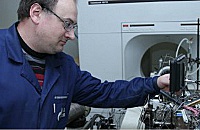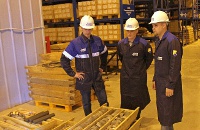1st International Scientific conference “Studies of Petroleum Reservoir Systems: Challenges & Prospects (SPRS-2016)

Date and venue
September 12–14, 2016
Gazprom VNIIGAZ LLC
142717, Razvilka, Leninsky district, Moscow region, Russia
Tel.: +7 498 657 4666
Fax: +7 498 657 4421
E-mail: sprs2016@vniigaz.gazprom.ru
Contacts
 | Marina Plotnikovа, manager tel.: +7 498 657 46 66 mob.: +7 916 102 83 78 fax: +7 498 657 96 00 |
 |  |  |
Ladies and gentlemen!
We invite you to participate in the 1st International Scientific conference “Studies of Petroleum Reservoir Systems: Challenges & Prospects (SPRS-2016)", to be held in LLC "Gazprom VNIIGAZ" on September 12–14, 2016.
Scientists and specialists from universities, academic institutions, research centers, as well as heads and experts of leading Russian and foreign companies will meet to discuss current problems, new opportunities and technologies in the field of studies of reservoir systems (core and fluids) for oil and gas.
The Conference Program includes the Plenary Session, 4 Technical Sessions, Poster sessions and the Closing Round Table.
Plenary Session
- Current status, problems and prospects of studies of reservoir systems (core, fluids) for oil and gas
- Development of a systematic approach to the study of core and reservoir fluids of oil and gas fields in PJSC «Gazprom» (the Corporate system of studies of core samples and fluids)
- Modern methods of researches of core and reservoir fluids.
- Methods for modeling phase behavior of reservoir systems.
Technical Sessions:
Session А. Gas-condensate and gas-dynamic researches of wells
- Planning of gas-condensate, gas-dynamic studies: Approaches and Technologies.
- Reserve calculation, forecasting of field development using gas-condensate studies, well test and geological-technological models.
- Improvement of equipment and methods for taking representative samples of reservoir fluids.
- Improvement of the methodology interpretation of gas-dynamic researches of wells.
- Studies of the processes occurring in the bottom-hole zone of gas condensate wells.
- Modern technologies for the collection, storage and processing of information during gas-condensate and gas-dynamic studies.
Session В. Core analysis of reservoir rocks and rocks-tires oil and gas
- Methods and results of wellsite services, routine core analysis, petrology and special core analysis.
- New methods and experience of well logging data interpretation on the basis of complex investigations of core material.
- The distribution of porosity, permeability, geochemical, etc. properties of reservoir rocks and rocks-tires.
- New methods of research of elastic-plastic properties of the core material.
- New approaches to typing of reservoir rocks and tires for the compilation of geological and hydrodynamic models.
Session С. Reservoir fluids and their components
- Comprehensive laboratory studies of physical and chemical properties and technological characteristics of reservoir fluids.
- Mathematical modeling of phase behavior of gas condensate reservoir systems.
- New approaches to the study of the phase transitions in reservoir fluids.
- Equations of state and phase equilibria.
- Thermodynamic properties of reservoir fluids.
- Transport coefficients: viscosity, thermal conductivity, diffusion.
- Surface and interfacial tension.
- Properties and phase behavior of natural gas hydrates and its components.
Session D. Filtration of multiphase systems
- New methods of experimental studies of multiphase flow in porous media (stationary/non-stationary, the equilibrium/non-equilibrium filtration).
- Visualization of multiphase flow of fluids in porous media (including the use of tomography and mathematical modeling).
- New approaches to the interpretation of the results of experimental studies of the multiphase flow using a computer simulation.
- New approaches to the creation of geological and hydrodynamic models.
- Experimental study and mathematical simulation of processes of hydrodynamics and mass transfer in low-permeability reservoirs and reservoirs of complex structure.
Poster Session
Round tables
- Methodology of selection of core and formation fluids in the drilling of exploration and production wells.
- The concept of development of normative-methodical documentation for well logging, gas-condensate studies and laboratory petrophysical research.
- Problems of development and manufacture of experimental setups and equipment for the study of core and fluid.
Official language of the Conference
Official languages of the Conference are Russian and English. Speakers should submit their materials in Russian or English or both. The simultaneous translation will be provided.
Abstract submission
Deadline for abstract submission is August 15, 2016. Abstracts shall be then considered by the Organizing Committee of the Conference. The abstract volume should not exceed 800 signs (max), including the names of authors, company, addresses and the name of the contact person to exchange necessary information. Abstracts should be submitted in Microsoft Word and Adobe PDF format. Abstracts should clearly summarize the contents of the paper.
Abstracts sent by fax shall not be considered.
Abstracts should be submitted by e-mail or on CDs at the address:
Conference SPRS-2016
Organizing Committee
GAZPROM VNIIGAZ LLC
142717, Moscow region, Razvilka, Leninskiy district.
Tel.: +7 (498) 657-46-66
E-mail: sprs2016@vniigaz.gazprom.ru
Key dates
| Deadline for abstracts | — | August 15, 2016 |
| Deadline for papers | — | September 01, 2016 |
Registration form
The registration form in MSWord and Adobe PDF format is available on our site. Please, fill in the form and send it by fax or e-mail. You can also register online.
After your registration form is received, the invoice for the registration fee will be sent to you. As soon as the payment is effected, we will send you the confirmation by e-mail.
Registration fee (including VAT)
In the sum equivalent to 500 euro before/on August 01, 2016,
600 euro after August 01, 2016
Discount conditions:
—10% for 3 participants of the company attending the Conference,
The registration fee includes:
- participation in all Conference sessions;
- delegate's pack (including delegate’s briefcase, notepad, program, list of abstracts and a souvenir);
- conference Proceedings CD (to be posted after the Conference);
- attendance at all presentations and ESGI-2015 exhibition stands;
- welcome party and farewell party;
- coffee breaks, lunches.
